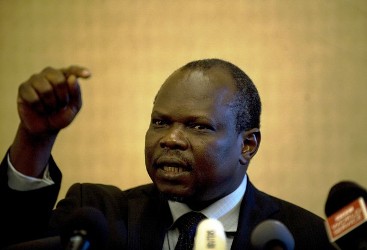SPLM’s Amum distances himself from dismissal of six members in Aweil
May 11, 2013 (JUBA) – The secretary-general of the South Sudan ruling party (SPLM), Pagan Amum, has distanced himself from the controversial dismissal of six members of his party in Northern Bahr el Ghazal state, saying he did not want to get involved in “political allegations lacking substantial evidence”.

“We did not dismiss you. It is the SPLM in Aweil which dismissed you”, Amum told representatives of the six expelled members on Friday. His deputy, Anne Ito, says she also regrets signing a recommendation letter of dismissal she received from the state after dispatching a fact-finding committee last April to investigate the allegations.
Ito says the committee claimed to have met with both sides to hear their version of events and that she believed the report to be credible at the time.
She did not say whether the decision would be cancelled or upheld.
The state recommended the dismissal of the members on the basis that it was approved by the national secretariat which Ito represented in the letter dated 2 July 2012.
Based on the committee’s findings, the national secretariat endorsed the state branch’s decision to expel the members, finding it to be a valid and lawful.
“The general secretariat therefore endorses the decision of the SPLM state chairperson and directs the state secretariat to proceed with implementation of the decision of the state chairman”, the letter said.
However, one of the expelled members, Kuac Wek Wol, denied meeting the investigating team and described the decision as “unilateral action to intimidate members”.
Politicians in the state of Northern Bahr el Ghazal have been at odds with governor Paul Malong Awan over his management of state affairs.
Those critical of his administration’s performance say Awan is widely viewed as someone who does not tolerate criticism, however constructive.
According to a 2011 report by the National Bureau of Statistics, Northern Bahr el Ghazal is South Sudan’s poorest state, with residents repeatedly calling for political action to improve people’s quality of life in the region.
(ST)
